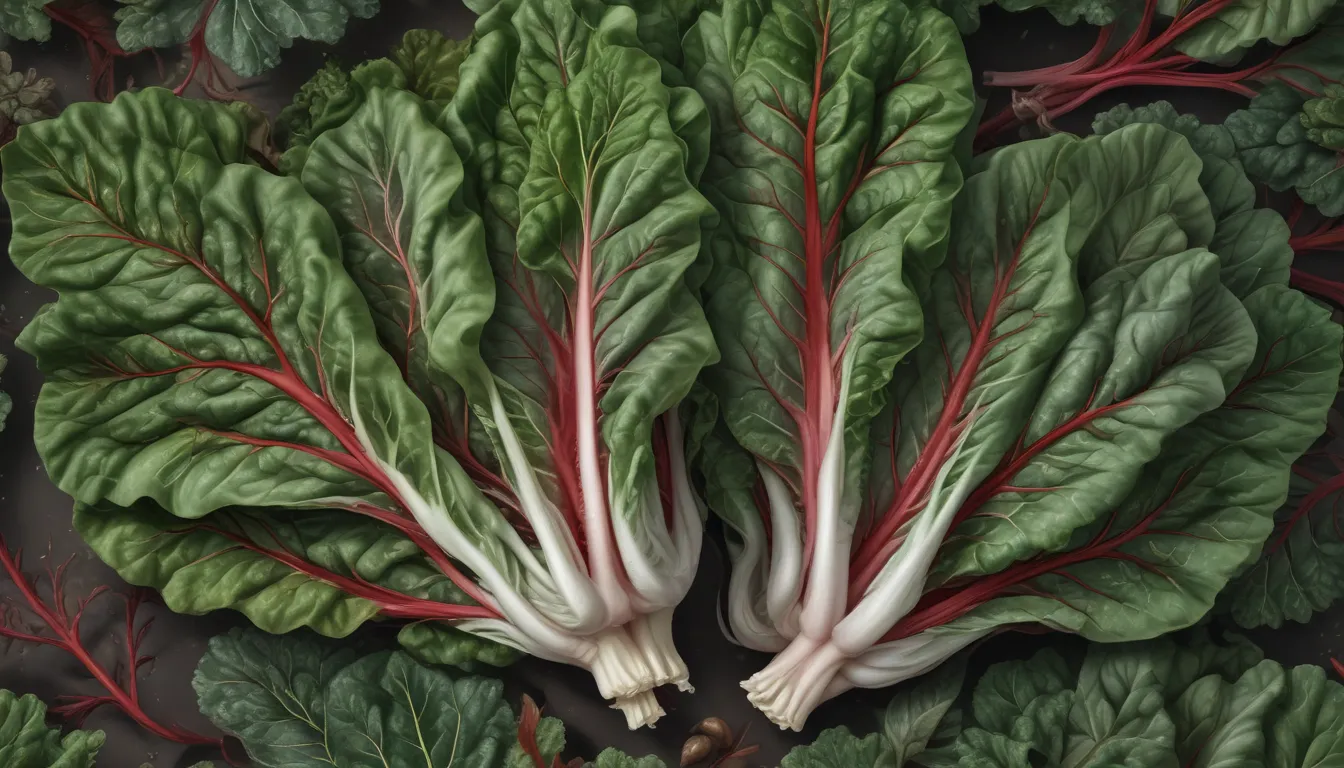The pictures in our articles might not always show exactly what the text is talking about. We use these images to make the article more interesting and eye-catching. They are there to add to the text, but not to replace it or show every detail.
Are you looking to add a burst of color and nutrition to your meals? Look no further than silverbeet, also known as Swiss chard or chard. This vibrant leafy green vegetable is not only visually appealing but also a powerhouse of health benefits. In this article, we will explore 12 fascinating facts about silverbeet that will leave you amazed and inspired to incorporate this versatile vegetable into your diet. Whether you are a seasoned silverbeet enthusiast or new to this leafy green, get ready to discover the wonders of silverbeet and how it can elevate your culinary creations.
Unlocking the Mystery of Silverbeet
Silverbeet, a close relative of beets and spinach, is a nutrient-packed leafy green known for its large, dark green leaves and colorful stalks. It is a nutritional powerhouse, rich in essential vitamins such as A, C, and K, minerals like magnesium, potassium, and iron, as well as dietary fiber. Its versatility in the kitchen makes it a flexible ingredient that can be enjoyed in various cuisines worldwide. Not only does silverbeet offer a colorful and flavorful addition to your meals, but it also provides a wide range of health benefits, from promoting healthy digestion to boosting your immune system.
12 Fascinating Facts About Silverbeet
-
Variety of Colors: While the most common variety of silverbeet features deep green leaves and white stalks, you can also find silverbeet with vibrant red, yellow, or orange stalks, adding a pop of color to your dishes.
-
Antioxidant Powerhouse: Silverbeet is rich in antioxidants such as beta-carotene and lutein, which help protect the body against free radicals and reduce the risk of chronic diseases.
-
Low-Calorie Superfood: If you are watching your calorie intake, silverbeet is an excellent choice. It is low in calories but still packs a punch in terms of essential nutrients.
-
Digestive Health: The high fiber content in silverbeet promotes healthy digestion and can help prevent constipation, supporting regular bowel movements.
-
Folate-Rich: Silverbeet is an excellent source of folate, making it a valuable addition to the diet of pregnant women and those trying to conceive.
-
Easy to Grow: Whether you have a garden or a small balcony, you can easily grow silverbeet. It thrives in various climates and requires minimal maintenance.
-
Culinary Versatility: From Mediterranean dishes to Asian stir-fries, silverbeet can be used in a wide array of cuisines due to its mild flavor and flexible cooking methods.
-
Long Shelf Life: When stored properly, silverbeet can last for up to two weeks in the refrigerator, making it a convenient vegetable to have on hand.
-
Beautiful Presentation: With its vibrant colors and attractive leaves, silverbeet can elevate the visual appeal of your dishes, serving as both a garnish and a main ingredient.
-
Nutritional Powerhouse: Silverbeet is rich in vitamins A, C, and K, as well as minerals like iron and magnesium, offering a wide range of health benefits to those who enjoy it.
-
Ease of Cooking: Whether you sauté it, steam it, or add it to soups and stews, silverbeet is a versatile ingredient that can be incorporated into numerous recipes with ease.
-
Potential Health Benefits: Silverbeet can support healthy digestion, boost the immune system, promote strong bones, and provide an array of other health benefits to those who include it in their diet.
Embrace the Wonders of Silverbeet in Your Kitchen
Incorporating silverbeet into your diet is not only a delicious choice but also a smart one when it comes to your health. Whether you are a seasoned chef looking to experiment with new ingredients or a beginner eager to explore the world of leafy greens, silverbeet is a fantastic addition to any meal. So go ahead, pick up some silverbeet, and let your culinary creativity flourish with this versatile and nutritious vegetable.
Conclusion: Discover the Magic of Silverbeet
Silverbeet, with its vibrant colors, nutritional content, and culinary versatility, is a superstar in the world of leafy greens. Whether you enjoy it in a salad, stir-fry, or soup, silverbeet can add a burst of freshness to your dishes along with a myriad of health benefits. So why not give silverbeet a try in your next recipe? Your taste buds and your body will thank you for it.
FAQs: Your Silverbeet Questions Answered
-
What is silverbeet?
Silverbeet, scientifically known as Beta vulgaris, is a leafy green vegetable closely related to beets and spinach, known for its dark green leaves and colorful stalks. -
How do I cook silverbeet?
Silverbeet can be cooked in various ways, including sautéing, steaming, or adding to soups and stews. Make sure to trim the tough ends of the stems before cooking. -
Can I eat the stems of silverbeet?
Yes, the stems of silverbeet are edible and contain valuable nutrients. They can be cooked along with the leaves for added flavor and texture. -
How long does silverbeet last in the refrigerator?
With proper storage, silverbeet can last up to a week in the refrigerator. Remove any ties or bands, store in a plastic bag or airtight container with a damp paper towel to maintain freshness. -
Can I freeze silverbeet?
Yes, you can freeze silverbeet for later use. Blanch the leaves, cool them in an ice bath, squeeze out excess moisture, and freeze in freezer-safe bags or containers. -
What are the health benefits of eating silverbeet?
Silverbeet boasts numerous health benefits, including promoting healthy digestion, boosting the immune system, and providing essential vitamins and minerals. -
Can silverbeet be substituted for spinach in recipes?
Yes, silverbeet can be used as a substitute for spinach in many recipes, although it has a slightly different flavor profile and cooking time. -
Is silverbeet safe for everyone to eat?
Silverbeet is generally safe for consumption, but individuals with kidney issues may need to monitor their intake due to its oxalate content. As always, consult a healthcare professional with specific health concerns.
In conclusion, silverbeet is a fantastic addition to any diet, offering a wide range of health benefits, culinary versatility, and visual appeal. Whether you're a seasoned chef or a beginner in the kitchen, exploring the wonders of silverbeet can open up a world of delicious possibilities. So why not give silverbeet a try and unleash your culinary creativity with this remarkable leafy green?






